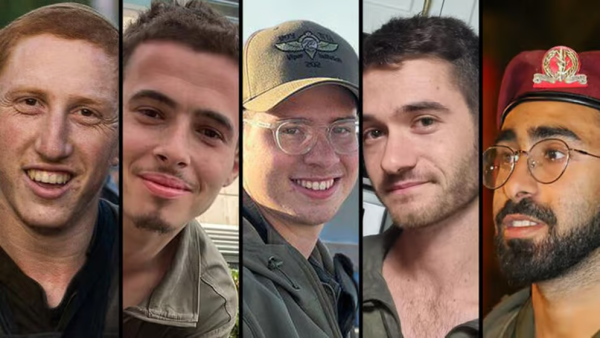By Leah Garber
אייכה? | Ayeka? | Where are you?
הנני | Hineni | Here I am.
On the morning of October 7, the Jewish world heard the call and responded immediately, standing up to say: הננו | Here we are.
Ever since, despite unprecedented rising rates of antisemitism and acts of physical and verbal violence aimed at you, at all Jews worldwide, you have been there for us in every possible way. Even as you face increased security in your synagogues and pro-Palestinian protesters disrupting your JCCs’ communal celebrations, you hold our hurting, tired nation above stormy waters and waves of hatred. Hineni, you say; here I am.
On the eve of Yom HaAtzmaut, Israel’s Independence Day, on the fragile, delicate seam between pain and appreciation, between memory and recognition, the traditional torch-carrying ceremony was held on Mount Herzl in Jerusalem.
Every year the ceremony is dedicated to pioneering Israelis who devote their lives to the common good. Twelve lights, representing the 12 tribes of Israel are lit, excitedly and solemnly. Thus, with great national pride, Memorial Day gives way to Independence Day, and the celebrations begin.
This year, however, there was nothing festive about the ceremony.
Unlike every other year, 44 torches were lit this year. Twelve memorial torches were lit by bereaved family members at various sites in the south of Israel. Standing on soil saturated with blood and tears, the torches were lit in memory of the heroes and victims of that horrific, black Sabbath. Orphans, widows, and bereaved parents, all stood still, lighting up the night sky with sparks of fire, flames carrying their cries to the heavens, their tears watering fields of sorrow.
Twelve other torches of heroism were lit too. These flames recognized the heroism inherent in Israeli society and the beauty of the rare nation and extraordinary people who rose as one to say, Hinenu | Here we are. They are the security and rescue forces, the psychological and medical teams, the scientists who developed the technology ensuring we could protect ourselves. They are our soldiers and their families. They are those fighting the social media battle, day and night, 24/7. And they are the endless stream of Israelis who volunteer day in and day out.
One torch recognized heroism that comes from afar. Debra Silverstein, an alderman in Chicago’s 50th Ward and the city’s only Jewish lawmaker, together with Rabbi David Meyer, chief executive of PaJeS, the U.K.’s Jewish schools’ network, lit the global Jewish community torch. Alderman Silverstein, known for her courageous, tireless efforts to oppose a resolution that called for an immediate ceasefire without the release of hostages, stood at Mount Herzl in Jerusalem and when asked, Ayeka? | Where are you?, responded Hineni | Here I am.
This torch represented not only your support and commitment but our gratitude as well. Indeed, the flames that were lit on five continents were received in Jerusalem by our Israeli thankfulness, united in one, strong, solid flame. The global Jewish community has always—and this year more than ever—stood bravely by our side, even as they combat their own local threats. Thank you!
Near the 11 torches and the heroes of Israel and the Jewish world who stood next to each one, was one unlit torch, the torch for the 132 hostages who remain imprisoned in Gaza. When it was ignited, the fire that erupted was particularly scorching. It was carried over the mountain in Jerusalem and lit up the sky of the city—a painful reminder that as long as our people and our hearts are held captive in Gaza, we will never celebrate Independence Day with joy. Could the hostages see the flames? Did its heat reach their hearts and warm them? Did it dry their tears? Could they hear it whisper: “We are waiting for you. come home.”?
Meanwhile, increasingly widespread rocket fire continues to hit us in the north and the south, and our sons continue to be called up to return and enlist in the reserves. Nonetheless, we awoke this morning to further proof that the eternal bond between Israel and the Jewish world is present in good and difficult times—but comes with a toll. Five soldiers were killed tonight by friendly fire in a tragic accident in Gaza. Among those killed was 20-year-old Sergeant Ilan Cohen, a lone soldier from Argentina who said “Hineni,” tying his fate with Israel and enlisting in a combat unit where he met his death.

Look at the beautiful faces of the best sons of our country. These are the soldiers who, carrying a tremendous sense of commitment to their people and country, went to battle knowing they may or may not return. May they rest in peace.
It’s been a strange week. It was much easier to focus on the pain of Yom HaZikaron, Memorial Day, than to muster the appropriate mood to mark Yom HaAtzmaut, Independence Day.
Since Memorial Day, just three days ago, eight Israelis have been added to the ranks of the war martyrs. The war exacts an unbearable price, filling the cup of suffering and sorrow until it cannot hold another drop, pulling to overflow, and ignoring the limitations of the human heart to contain so much suffering.
My dear, hurting homeland, why is it so hard to live here? And yet, Hineni, I will never stop loving you.
Together, united, we will overcome.
Leah Garber is a senior vice president of JCC Association of North America and director of its Center for Israel Engagement in Jerusalem.
Reader Interactions